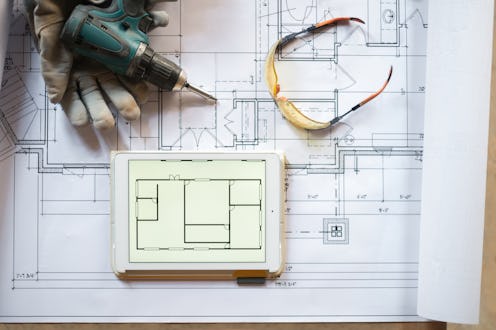Before You Move
The Pros & Cons Of Renting vs. Buying
It’s not just about the money.
by Kaitlyn Wylde
Updated:
Originally Published:

In How To Move To The Suburbs, Bustle breaks down the challenges and joys of leaving the city in a step-by-step process. In this installment, Kaitlyn Wylde unpacks the four main decisions you need to make once you’ve decided to relocate: commuter towns vs. rural neighborhoods, new build houses vs. old homes, moving home vs. moving somewhere new, and in this column, renting vs. buying.
Renting
The Pros
- We’re in a seller’s market right now, and renting can afford you stability without any pressure to put down roots, giving you the freedom to let job opportunities, relationships, and resources determine where you call home.
- Owning real estate doesn’t make you any more happy than renting it. Renting also puts less pressure on your finances with predictable expenses and lower upfront costs. You’re (mostly) not responsible for broken things. Your landlord must maintain habitable living conditions for tenants.
- It’s easier to break a lease than to sell a house.
Tip: A potential landlord will ask for all your background info; why shouldn’t you vet them, too? Sites like Rate My Landlord or Whose Your Landlord crowdsource reviews, and Nextdoor or neighborhood Facebook groups can help you get the 411 on your building. You can even look up your landlord’s name and LLC, or that of the property management company, in your (new) town’s court records to see if they’ve ever sued a tenant — or vice versa — and why.
The Cons
- In some areas, you might find that rental prices are similar to comparable monthly mortgage payments — with the key difference being that with renting, you’re not building equity.
- You can’t make radical changes.
- You can technically get kicked out at any time.
Tried It & Liked It
“I don’t think of renting as throwing money away. My life is in flux right now and I’m not sure where I want to settle down, so renting allows me to test out different options. Plus, maintenance is covered by my landlord, so I don’t have to worry about getting hit with a crazy bill if something goes wrong with the apartment that’s not my fault.” – Elisa, 28, copywriter in Florida
Buying
The Pros
- It’s an investment. Your home will typically increase in value about 2% each year, without even updating it.
- You can play Joanna Gaines and decorate your own space entirely your way.
- Stability. If you have a fixed-rate mortgage (FRM), your monthly expense won’t change (unlike with renting, where your landlord can raise your rent with as little as 30-day notice). Plus, being a homeowner can boost self-esteem and studies show that you’re more likely to bond with your community if you’re a homeowner.
Tip: Around a quarter of Americans live in the kinds of planned communities that belong to a homeowner’s association (HOA), which organize neighborhood upkeep for a mandatory membership fee. Some HOAs help you out by paying for trash pickup or maintaining a community pool (!); others can be low-key bullies about things like paint colors or driveway maintenance. Are you sure you’re OK with Karen next door commenting on your choice of flag?
The Cons
- Thanks to a COVID-inspired increased interest in suburban living, homes are often selling for more than they may be worth; according to Redfin, the median sale price of homes rose 6.7% in 2020, and that number is projected to rise again this year. What’s more, there’s so much competition that homes are more likely to sell fast. Read: you have to be a shark to even buy a house you can afford, and it might not be affordable by the time your bid is accepted.
- Massive upfront costs. The national average is 20% down as a deposit. You’ll want to budget 2% to 5% of the full price for closing costs, too, and if you accept the house as-is, post-sale repairs are all on you.
- Massive responsibility. A 2020 survey found that over 32% of recent homebuyers had anxiety as a result of the purchase.
Tried It & Liked It
“While buying came with more unexpected costs than I could have imagined, it feels like I have an ongoing project. There’s always something to do. I’m really enjoying this chapter of life where I use my free time to better the house and make it my own, and it feels really good to know I have an investment and stability.” – Aly, 34, interior designer in Vermont
Interviews have been edited and condensed for clarity.
This article was originally published on